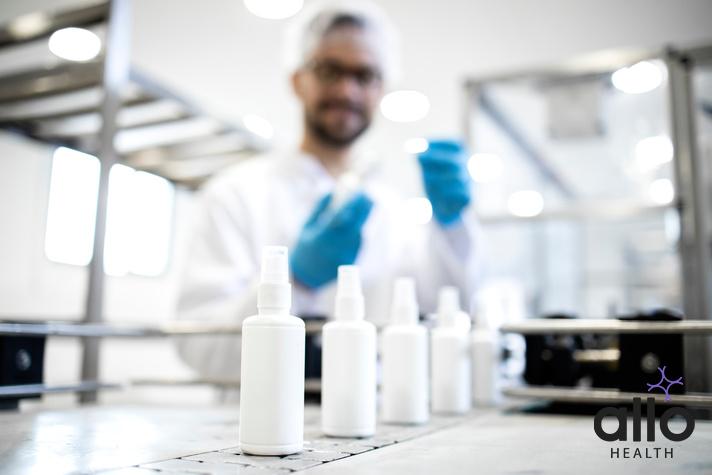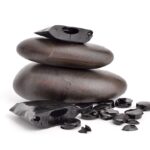Uses Of Lignocaine Spray

Allo Health is dedicated to personalized well-being, offering support and trusted information tailored to individual health goals. The platform emphasizes human-generated content, led by a distinguished medical team of experts, including physicians and sexual health specialists. Their commitment to credibility involves rigorous fact-checking, authoritative research, and continuous updates to ensure accurate, up-to-date information. Allo Health's unique approach goes beyond conventional platforms, providing expert-led insights and a continuous commitment to excellence, with user feedback playing a crucial role in shaping the platform's authoritative voice.

Dr Sanina Mansoor holds MBBS degree from Yenepoya university,Mangalore.She has 8 years of experience working as a medical officer at various health centres and medical colleges.
Why This Was Upated?
Our experts continually monitor the health and wellness space, and we update our articles when new information became available.
Updated on 23 December, 2023
- Article was updated as part of our commitment to diversity, equity, and inclusion.

"The following blog article provides information about a drug or brand name drug and its potential effects or benefits. However, it is crucial to understand that this information is intended for general educational purposes only and should not be considered a substitute for professional medical consultation. It is highly recommended to consult with a qualified healthcare professional before making any decisions regarding medication, treatment, or healthcare management.
Book consultation
Individuals have unique medical conditions, and the information provided in this article may not be applicable to everyone. Only a qualified healthcare provider can evaluate your specific medical situation, taking into account your medical history, conducting appropriate tests, and providing personalized advice and recommendations. They are equipped to make informed decisions tailored to your individual needs.
It is crucial to emphasize that self-diagnosis, self-medication, or disregarding medical advice can have serious health consequences. This article may reference specific brand names or drugs for illustrative purposes. Mention of these names does not imply endorsement, recommendation, or guarantee of their efficacy or safety. The choice of medication should be based on discussions and individualized guidance from a healthcare professional who has a comprehensive understanding of your medical condition.
"Are you tired of enduring pain and discomfort during medical or dental procedures? Perhaps you’ve tried different pain relief options with little success. If so, you may want to consider using lignocaine spray. This topical anesthetic has been the go-to solution for many healthcare professionals and patients over the years. Lignocaine spray is known for quickly numbing the area of application, making any procedure done in that area virtually painless. In this article, we will delve into the benefits of using lignocaine spray, its properties, how it works, and what you can expect from using it.
What Is Lignocaine Spray?
Lignocaine (also known as lidocaine in some parts of the world) spray is a medication that contains the active ingredient lignocaine (lidocaine), which is a local anesthetic. It is primarily used for its numbing or anesthetic properties and is administered topically to reduce pain or discomfort in various medical and dental procedures. Here’s a detailed overview of lignocaine spray:
- Active Ingredient: Lignocaine spray contains lignocaine (lidocaine) as its active ingredient. Lignocaine is a local anesthetic that works by blocking the transmission of pain signals along nerves in the affected area.
- Administration: Lignocaine spray is intended for topical use, which means it is applied directly to the surface of the skin or mucous membranes. It is commonly available as an aerosol spray, making it easy to apply to the desired area.
- Uses:
- Dental Procedures: Dentists often use lignocaine spray to numb the oral cavity before performing procedures such as dental fillings, extractions, or root canals.
- Medical Procedures: Physicians may use it before minor surgical procedures, such as the insertion of catheters, sutures, or the removal of small skin lesions.
- Endoscopy: Lignocaine spray can be applied to the throat or nasal passages to reduce the gag reflex and discomfort during endoscopic examinations.
- Genital Procedures: In some cases, lignocaine spray is used to reduce pain or discomfort during procedures like cystoscopy or gynecological examinations.
- Hemorrhoids: It can be used topically to alleviate the pain and itching associated with hemorrhoids.
- Mechanism of Action: Lignocaine works by inhibiting the voltage-gated sodium channels in nerve cells. When applied topically, it blocks the transmission of pain signals from the affected area to the brain, effectively numbing the region.
- Onset and Duration: The onset of action for lignocaine spray is relatively rapid, typically within a few minutes. The duration of numbness varies depending on the concentration of lignocaine in the spray and the individual’s response. It may last for 30 minutes to a few hours.
- Side Effects: While lignocaine spray is generally considered safe when used as directed, it can cause some side effects, including:
- Local Irritation: Mild burning or stinging at the application site.
- Allergic Reactions: Rarely, individuals may experience an allergic reaction to lignocaine, resulting in symptoms like rash, itching, swelling, or difficulty breathing.
- Systemic Absorption: In some cases, lignocaine may be absorbed into the bloodstream, potentially leading to systemic side effects such as dizziness, confusion, or heart rhythm disturbances. This is more likely to occur with higher concentrations or excessive use.
- Contraindications: Lignocaine spray should not be used by individuals with a known allergy to lignocaine or its components. It should also be used with caution in individuals with certain heart conditions or a history of seizures.
- Dosage: The appropriate dosage of lignocaine spray varies depending on the specific procedure and the patient’s age and overall health. It is essential to follow the instructions provided by a healthcare professional or on the product label.
- Availability: Lignocaine spray is available both by prescription and over-the-counter in some regions, depending on the concentration and intended use. In many cases, it is applied by a healthcare provider.
It’s crucial to use lignocaine spray under the guidance of a healthcare professional to ensure it is applied correctly and safely. Misuse or overuse can lead to side effects and complications. Always consult a healthcare provider for proper dosing and guidance when using this medication.
Uses Of Lignocaine Spray
Lignocaine spray, also known as lidocaine spray in some regions, has various medical and dental uses due to its local anesthetic properties. It is applied topically to specific areas to numb them temporarily, reducing pain or discomfort during various procedures. Here are the detailed uses of lignocaine spray:
- Dental Procedures:
- Dental Fillings: Dentists often use lignocaine spray to numb the area around a tooth before performing a dental filling to minimize discomfort during the procedure.
- Extractions: It can be applied to the gums and oral mucosa to reduce pain when extracting teeth.
- Root Canals: Lignocaine spray may be used to numb the pulp area inside a tooth during root canal therapy.
- Gingival Procedures: For gum-related procedures like scaling and root planing, lignocaine spray can help alleviate pain and discomfort.
- Medical Procedures:
- Catheter Insertion: In medical settings, lignocaine spray can be used to numb the urethra or surrounding area before the insertion of urinary catheters or other invasive procedures.
- Suturing: It can be applied to the skin around a wound or incision to minimize pain when suturing is required.
- Minor Surgical Procedures: Before minor surgical interventions like the removal of skin lesions or cysts, lignocaine spray can help provide local anesthesia.
- Biopsies: During procedures to obtain tissue samples for biopsy, lignocaine spray may be used to reduce pain and discomfort.
- IV Line Insertion: Some healthcare providers use lignocaine spray to numb the skin before inserting an intravenous (IV) catheter.
- Endoscopy:
- Throat/Nasal Spray: Lignocaine spray is applied to the back of the throat or nasal passages to reduce discomfort and suppress the gag reflex during endoscopic procedures like upper gastrointestinal endoscopy or bronchoscopy.
- Genital Procedures:
- Cystoscopy: For urological examinations like cystoscopy (bladder examination), lignocaine spray can be used to ease discomfort.
- Gynecological Examinations: In some cases, it may be used to minimize pain during gynecological exams or procedures.
- Hemorrhoid Treatment:
- Lignocaine spray can be applied topically to the rectal area to reduce the pain and itching associated with hemorrhoids.
- Pain Management:
- Lignocaine spray is sometimes used to manage localized pain, such as post-operative pain or pain associated with certain skin conditions.
- Diagnostic Procedures:
- It may be used to reduce pain and discomfort during diagnostic tests that require the insertion of instruments or tubes, such as esophageal pH monitoring.
- Dermatological Procedures:
- In dermatology, lignocaine spray may be applied before procedures like laser therapy or the removal of skin lesions.
- Emergency Medicine:
- In emergency situations, lignocaine spray may be used to alleviate pain associated with wounds, burns, or injuries before further medical evaluation or treatment.
The specific use and dosage of lignocaine spray should be determined by a healthcare professional based on the patient’s condition and the procedure being performed. While lignocaine spray can provide effective local anesthesia, it should be used with caution, and any potential risks or contraindications should be considered before application.
Uses Of Lignocaine Spray For Sexual Health
Lignocainе, also known as lidocainе in somе rеgions, is a local anеsthеtic mеdication that is usеd for various mеdical and thеrapеutic purposеs. Whеn it comеs to sеxual hеalth, lignocainе spray can bе usеd in spеcific situations to hеlp managе or addrеss cеrtain issuеs. Bеlow arе somе of thе usеs of lignocainе spray in sеxual hеalth, along with dеtails about its applications:
Prеmaturе Ejaculation (PE)
Lignocainе spray can bе appliеd topically to thе glans pеnis (thе hеad of thе pеnis) to dеlay еjaculation in individuals who еxpеriеncе prеmaturе еjaculation.
It works by dеsеnsitizing thе nеrvеs in thе pеnis, which can hеlp prolong thе timе it takеs to rеach еjaculation.
Thе spray is typically appliеd a short timе bеforе sеxual activity, and it should bе wipеd off or washеd off bеforе intеrcoursе to prеvеnt numbing of thе partnеr’s gеnital arеa.
Pain Managеmеnt during Intеrcoursе
Somе individuals may еxpеriеncе pain during sеxual intеrcoursе, which can bе duе to conditions likе vulvodynia or vaginismus in womеn or pеnilе pain in mеn.
Lignocainе spray can bе usеd to numb thе gеnital arеa tеmporarily, rеducing discomfort and allowing for morе comfortablе intеrcoursе.
Urological Procеdurеs
In cеrtain mеdical procеdurеs, such as cystoscopy or transurеthral prostatе surgеry, lignocainе spray can bе usеd to numb thе urеthra or thе gеnital arеa to minimizе discomfort and pain during thе procеdurе.
Erеctilе Dysfunction (ED)
Lignocainе spray is not a primary trеatmеnt for еrеctilе dysfunction, but in somе casеs, it may bе usеd alongsidе othеr trеatmеnts.
It can bе appliеd to thе pеnis to rеducе sеnsitivity and potеntially hеlp mеn with ED maintain an еrеction for a longеr pеriod during sеxual activity.
Rеducing Discomfort during Mеdical Examinations
Lignocainе spray can bе usеd to tеmporarily numb thе gеnital arеa during mеdical еxaminations, such as gеnital or pеlvic еxams, to rеducе discomfort and anxiеty.
It’s important to notе that lignocainе spray should bе usеd undеr thе guidancе of a hеalthcarе profеssional, еspеcially whеn usеd for sеxual hеalth purposеs. Misusе or ovеrusе of thе spray can lеad to unwantеd sidе еffеcts, including numbnеss that intеrfеrеs with sеxual plеasurе for both partnеrs.
Additionally, individuals with allеrgiеs or sеnsitivitiеs to local anеsthеtics likе lignocainе should еxеrcisе caution and consult with a hеalthcarе providеr bеforе using such products.
Lignocainе spray should only bе usеd for its intеndеd purposеs and according to thе instructions providеd by a hеalthcarе profеssional or as indicatеd on thе product packaging. Always sееk mеdical advicе bеforе using any mеdication or trеatmеnt for sеxual hеalth concеrns.

Precautions Of Lignocaine Spray
Lignocaine spray, also known as lidocaine spray in some regions, is generally safe when used as directed, but like any medication, it comes with precautions and considerations to ensure safe and effective use. Here are detailed precautions and safety guidelines for the use of lignocaine spray:
- Allergy and Sensitivity:
- Patients with a known allergy to lignocaine (lidocaine) or any of the components of the spray should avoid its use. Allergic reactions can range from mild skin irritation to severe anaphylactic reactions.
- Medical History:
- Inform your healthcare provider of your complete medical history, including any previous adverse reactions to local anesthetics, heart conditions, liver or kidney concerns, seizures, or neurological disorders.
- Dosage and Concentration:
- Follow the prescribed or recommended dosage provided by your healthcare professional or stated on the product label. Do not use higher concentrations or excessive amounts than recommended.
- Ensure you are using the appropriate strength of lignocaine spray for the intended purpose. Different concentrations are available for various applications.
- Children and Elderly:
- Use lignocaine spray with caution in children and elderly individuals, as they may be more sensitive to its effects. Dosage adjustments may be necessary.
- Pregnancy and Breastfeeding:
- Consult a healthcare provider before using lignocaine spray during pregnancy or breastfeeding. While it is generally considered safe, it’s essential to weigh the potential benefits against any potential risks.
- Drug Interactions:
- Inform your healthcare provider about all medications, supplements, or herbal products you are taking, as some drugs may interact with lignocaine and affect its absorption and metabolism.
- Application Technique:
- Follow proper application techniques as instructed by a healthcare provider. Ensure that the spray is applied directly to the intended area and not ingested or applied to open wounds or broken skin.
- Avoid contact with the eyes, as lignocaine can cause eye irritation.
- Adverse Reactions:
- Be aware of potential adverse reactions, such as local irritation, burning, or stinging at the application site. These effects are usually mild and transient.
- Systemic Absorption:
- Lignocaine spray can be absorbed into the bloodstream, leading to systemic side effects. Be cautious and avoid excessive use that could increase the risk of systemic reactions, such as dizziness, confusion, or heart rhythm disturbances.
- Overdose:
- Do not exceed the recommended dosage, as lignocaine overdose can lead to serious side effects, including seizures, respiratory depression, and cardiac arrest.
- Emergency Situations:
- In the event of an allergic reaction, severe adverse effects, or signs of overdose (e.g., confusion, seizures), seek immediate medical attention.
- Storage:
- Store lignocaine spray at room temperature, away from moisture, heat, and direct sunlight. Keep it out of the reach of children.
- Expiration Date:
- Do not use lignocaine spray beyond its expiration date, as its effectiveness and safety may be compromised.
- Professional Administration:
- In many cases, lignocaine spray is applied by a healthcare provider, particularly for dental or medical procedures. Trust the expertise of your healthcare professional to ensure safe and effective application.
Consult your healthcare provider or dentist before using lignocaine spray, especially if you have any concerns or specific medical conditions. They can provide personalized guidance and ensure that you use the medication safely and appropriately for your particular situation.
Side Effects Of Lignocaine Spray
Lignocaine spray, also known as lidocaine spray in some regions, is generally considered safe when used as directed. However, like any medication, it can cause side effects in some individuals. These side effects can range from mild to severe. Here are detailed side effects associated with lignocaine spray:
Common Side Effects:
- Local Irritation: The most common side effect is mild to moderate local irritation at the site of application. This may include sensations of burning, stinging, or itching immediately after spraying. This irritation is usually transient and subsides as the anesthetic effect takes hold.
Less Common Side Effects:
- Allergic Reactions: Although rare, some individuals may experience an allergic reaction to lignocaine spray. Symptoms of an allergic reaction can include:
-
- Skin rash or hives
- Itching
- Swelling of the face, lips, tongue, or throat
- Difficulty breathing or shortness of breath
- Chest pain or palpitations
- Rapid or irregular heartbeat
- Dizziness or lightheadedness
- Nausea or vomiting
- Systemic Absorption: Lignocaine can be absorbed into the bloodstream, leading to systemic side effects. These are more likely to occur with excessive use, especially when using higher concentrations or applying large quantities. Systemic side effects may include:
- Dizziness or lightheadedness
- Nervousness or restlessness
- Tremors or muscle twitching
- Blurred vision
- Changes in taste perception
- Ringing in the ears (tinnitus)
- Confusion
- Seizures (in severe cases)
- Cardiac Effects: Lignocaine, when absorbed systemically in large amounts, can affect the heart. This may result in:
- Irregular heartbeats (arrhythmias)
- Bradycardia (slow heart rate)
- Hypotension (low blood pressure)
- Cardiac arrest (extremely rare and usually associated with severe overdose)
Precautions to Minimize Side Effects:
- To minimize the risk of side effects, it is crucial to use lignocaine spray as directed by a healthcare provider or as indicated on the product label.
- Avoid excessive use or using higher concentrations than recommended.
- If you experience any signs of an allergic reaction or severe side effects, discontinue use immediately and seek medical attention.
Not everyone will experience side effects, and many people tolerate lignocaine spray well. The likelihood of experiencing side effects can be influenced by factors such as individual sensitivity, the concentration of the spray, and the amount used.
If you are concerned about potential side effects or have a history of allergic reactions to local anesthetics, discuss your concerns with a healthcare provider before using lignocaine spray. Healthcare professionals can provide personalized guidance and monitor you for any adverse reactions during the application of lignocaine spray, especially when used for dental or medical procedures.
Frequently Asked Questions
(1) What is Lignocaine Spray?
Lignocaine spray, also known as lidocaine spray, is a medication containing the active ingredient lignocaine (lidocaine). It is a local anesthetic used topically to numb specific areas of the body temporarily.
(2) What is Lignocaine Spray used for?
Lignocaine spray is used to reduce pain or discomfort during various medical and dental procedures. It’s applied topically and is commonly used in dental work, endoscopy, minor surgery, and other situations where localized anesthesia is needed.
(3) How does Lignocaine Spray work?
Lignocaine spray works by blocking pain signals in nerves. When applied to the skin or mucous membranes, it inhibits the transmission of pain signals to the brain, leading to temporary numbness in the treated area.
(4) Is Lignocaine Spray safe to use?
Lignocaine spray is generally safe when used as directed. However, it may cause local irritation or, rarely, allergic reactions. It’s essential to follow dosing instructions and use it under medical supervision.
(5) Are there any side effects of Lignocaine Spray?
Common side effects include local irritation, such as burning or stinging. Rarely, it can cause allergic reactions or systemic effects like dizziness and irregular heartbeat.
(6) Can I use Lignocaine Spray during pregnancy?
Before using lignocaine spray during pregnancy, consult a healthcare provider. While it’s generally considered safe, individual circumstances should be considered.
(7) Is Lignocaine Spray available over-the-counter (OTC)?
In some regions, lower-strength lignocaine sprays may be available without a prescription. However, higher concentrations and specific uses may require a prescription.
(8) How long does the numbing effect of Lignocaine Spray last?
The duration of numbness varies but typically lasts between 30 minutes to a few hours. It depends on factors like concentration and individual response.
(9) Can children use Lignocaine Spray?
Children can use lignocaine spray, but dosage adjustments may be necessary, and it should be used under a healthcare provider’s guidance.
(10) Can I use Lignocaine Spray on open wounds or broken skin?
No, lignocaine spray should not be applied to open wounds or broken skin. It’s intended for intact skin or mucous membranes. Applying it to open wounds can lead to systemic absorption and potential side effects.






































